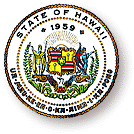
Governor OKs funds
for drug treatment
Lingle has released $10.7 million
of the $14.7 million allocated
nearly six months ago
Almost six months after the Legislature allocated $14.7 million for drug treatment, law enforcement and prevention programs to fight drug abuse, the Lingle administration yesterday released $7.3 million.
 At a news conference to announce the release of the money, Lt. Gov. Duke Aiona attributed the delay to the administration's "due diligence" to examine programs and determine whether money was "used efficiently and effectively."
At a news conference to announce the release of the money, Lt. Gov. Duke Aiona attributed the delay to the administration's "due diligence" to examine programs and determine whether money was "used efficiently and effectively."
"I am confident the money will be utilized as effectively as possible in helping to address some of the drug problems in our state," he said.
To date, the administration has released $10.7 million that the Legislature appropriated and is still reviewing whether to release the remaining $4 million. The balance under review includes $1.8 million the Legislature appropriated for adolescent drug treatment programs.
Money released yesterday will pay for adult and adolescent drug treatment, prevention and community Weed & Seed programs.
Previously, the Lingle administration released $219,000 to a residential treatment facility on the Big Island and $3.17 million to the Judiciary for the expansion of its drug court programs on Oahu and the neighbor islands. Included in that $3 million was $500,000 the Legislature appropriated for the treatment of nonviolent first-time drug offenders.
"We're ecstatic. Such a pressure has been lifted from our shoulders," said Gloria Egle-Garbutt, chief executive of the Big Island Substance Abuse Council, which runs drug treatment programs in four high schools that will share $450,000 with Radford High School on Oahu.
"We need the money quickly so there won't be a break in services," said Egle-Garbutt, who said that if they do not receive the money by November, they will need to lay off at least two of four staff substance-abuse counselors.
Aiona also announced that in a month he expects to unveil the administration's long-awaited legislative package to address the problem of illegal substance abuse and, in particular, the abuse of crystal methamphetamine or "ice."
The Lingle administration and the Legislature have both made the fight against ice a priority, but they have differed on their approaches. The administration has favored law enforcement and prevention while the Legislature has stressed drug treatment.
The governor did not sign the Legislature's omnibus ice appropriation bill (House Bill 2004), which was passed April 30 and became effective July 1.
The Legislature's bill, now known as Act 40, was the product of hearings and community meetings held by a joint House and Senate Task Force on Ice. While the Legislature held its hearings and meetings, Aiona held his own community meetings and conducted a drug summit last September to address the problem.
Aiona said yesterday he is about to wrap up meetings of work groups needed to form his legislative "action plan" for ice.
Repeatedly, Democrats have argued that the crisis must be addressed immediately and accused the Lingle administration of studying the problem but not forming a plan.
Appropriations still under review include money for community anti-drug campaigns and studies of the effects of ice use on children and impact of meth labs on the environment.
Myron "Andy" Anderson, chief executive of Hina Mauka, which provides inpatient and outpatient treatment services, said of Aiona's announcement: "This is great for people needing treatment who have not been able to access it."
Asked about the six-month delay in releasing the money, Anderson said, "The administration wanted to be sure that the agencies that receive state money are doing a good job."
In recent weeks, treatment providers and some Democratic legislators have criticized the administration for not releasing money sooner.
"Unfortunately, politics gets in the way," said Rep. Blake Oshiro (D, Aiea-Halawa), vice chairman of the House Judiciary Committee.
"We don't understand why it took the Lingle administration so long when there was a community outcry and the community asked us for this money."
House Majority Leader Scott Saiki (D, Moiliili-McCully) said: "I want to know how many young people have not been receiving treatment or help during this time. There is no justification for this."
Oshiro noted there is "a philosophical difference" between the Legislature and the administration on how to deal with the ice problem.
He noted the administration has been in favor of toughening law enforcement and prevention but that the Legislature wants money for treatment in addition to law enforcement and prevention.
Oshiro said he hoped the balance of the money would be released soon but acknowledged "this is a political season, a campaign season."
Money to fight 'ice'
Last April, the Legislature passed House Bill 2004 to fight drug abuse and set aside $14.7 million for drug treatment programs, drug courts, prevention and education. On April 30, the bill, now known as Act 40, went into law without the governor's signature. Of the money the Legislature appropriated, the governor yesterday released:
» $450,000 for school-based treatment programs serving four high schools on the Big Island (Hilo, Honokaa, Kealakehe and Laupahoehoe) and Radford High School on Oahu.Previously, the Lingle administration released:
» $219,000 for a Big Island Substance Abuse Center.
Source: Office of the Lieutenant Governor
|
www.hawaii.gov/gov/